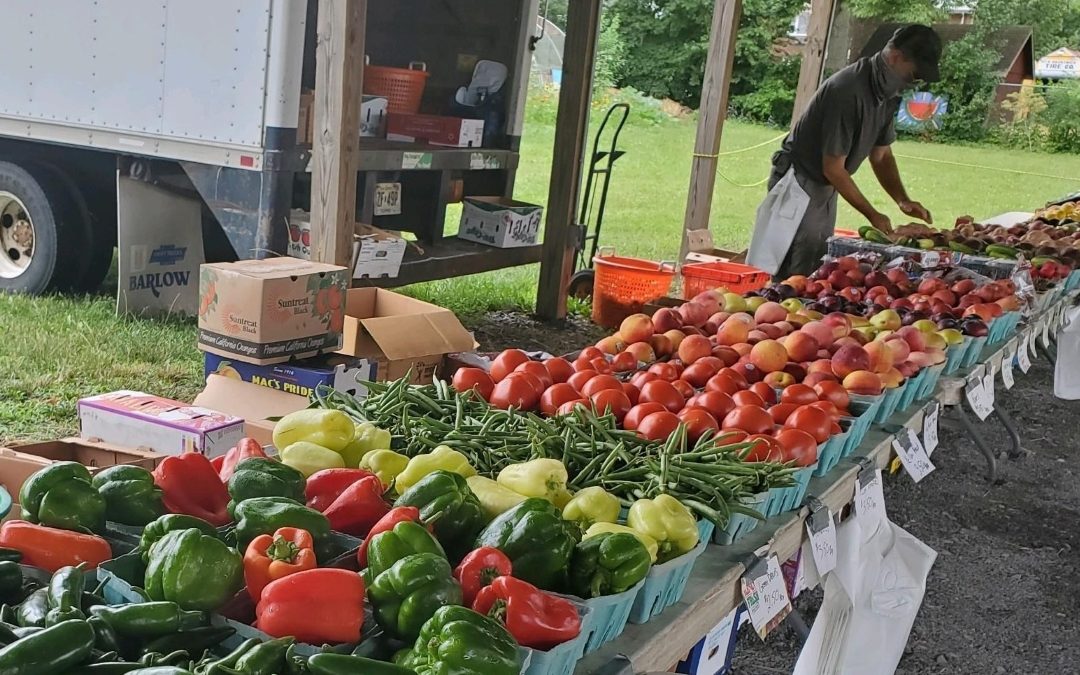The “Garden State” is home to more than 9,000 agricultural farms and is one of the country’s top producers of blueberries, cranberries, spinach, bell peppers, and peaches. However, according to a report by the Community FoodBank of New Jersey, more than 1.2 million New Jersey residents (13.5 percent of the state’s population) are likely experiencing food insecurity, defined as the lack of consistent access to adequate food to sustain an active, healthy life.
Even though nutritious fruits and vegetables may be relatively abundant throughout the state, there are still barriers that affect individuals’ and families’ choices when it comes to what foods they eat. Affordability and access to fresh produce are among the reasons that residents of New Jersey’s low-income communities, in particular, are not always able to reap what the state sows. Because of these inequalities, their health is at stake.
People who struggle with food insecurity are more likely to purchase inexpensive, unhealthy food to stretch their food budget. Unhealthy eating contributes to a host of medical issues, including diet-sensitive chronic diseases such as diabetes and high blood pressure. But people who are food insecure also are more likely to forgo important health services because of the costs, meaning they’re not taking prescribed medications or they don’t go to the doctor because their health insurance copays are too expensive.
It can become a vicious cycle that’s not easy to break.
A Prescription for Better Health
At Rutgers, a program called Veggie Rx is underway to provide healthy fruits and vegetables to New Brunswick’s poor and low-income residents. More than a lifeline to food, the program also helps to create awareness about the connections between food and health, and it provides tangible ways for residents to take care of their health.
Established in 2018, Veggie Rx represents a partnership among several health-oriented community programs that serve the city’s most vulnerable residents: New Brunswick Community Farmers’ Market, Robert Wood Johnson Medical School’s HIPHOP Promise Clinic, and Elijah’s Promise community kitchen.
Rutgers’ Veggie Rx founders include Rutgers Global Health Institute core faculty members Cara Cuite, assistant extension specialist for Rutgers Cooperative Extension and assistant professor of human ecology at the School of Environmental and Biological Sciences, and Karen WeiRu Lin, professor of family medicine and community health and assistant dean of global health at the medical school, as well as Lauren Errickson, the farmers’ market coordinator and a senior program administrator for Rutgers Cooperative Extension, and former medical student Joshua Gilens.
When they launched Veggie Rx at Rutgers, the program’s structure was minimalist. With faculty supervision, the medical students who run the Promise Clinic, which provides free primary care to patrons of Elijah’s Promise, gave their patients “prescriptions” (vouchers) for fruits and vegetables to “fill” (redeem) for free at the farmers’ market. Three years later, this arrangement continues, and Veggie Rx has expanded. Now, even more of the city’s residents can get produce vouchers by visiting a Veggie Rx pop-up site.
The Impact is Growing in New Brunswick
“A clear benefit of Veggie Rx is that it provides fresh produce to some of New Brunswick’s most vulnerable residents,” says Cuite. But the program serves up more than nutritious food. “It’s also helping to foster a culture of health and connection within the city’s underserved communities.” Other ways that Veggie Rx makes an impact include:
Health consultations that are part of the program are now available to more people.
Initially, only Promise Clinic’s established patients were eligible to participate in Veggie Rx. This year, a grant from Rutgers Community Health Foundation is supporting the program’s expansion. Now, all patrons of Elijah’s Promise can participate in Veggie Rx, not just those who are patients at the clinic.
For non-patients to receive the Veggie Rx produce vouchers, they participate in a health consultation with one of the clinic’s medical students. This interaction is an opportunity for city residents who do not have reliable access to quality health care to discuss their health status, ask questions, and get medical advice on how they can improve or maintain their health.
“It’s a way to talk about the relationship between food and health,” says Lin, the clinic’s faculty advisor, who has practiced in community health for more than 28 years. “Participants are learning that medication is not the only answer to treat high blood pressure, diabetes, or high cholesterol, and that fresh vegetables and fruits are promoting health.”
Conveniently located pop-up sites serve multiple needs.
Feedback from Promise Clinic patients who participated in Veggie Rx during its first season revealed that, while most patients were very happy to receive the produce vouchers, it wasn’t always easy to get to the farmers’ market when it was open to purchase the fruits and vegetables.
“Now that we can offer the Veggie Rx vouchers to more people outside of the clinic, we are trying to make the whole program more convenient—so that people can get a health consultation, voucher, and produce all in one outing,” says Cuite.
To do that, Veggie Rx is hosting pop-up sites throughout the city during times when the farmers’ market is open. And there’s an added benefit: a free hot meal provided by the Elijah’s Promise on Wheels food truck. The community kitchen also plays an important role in referring its patrons to the Veggie Rx pop-up sites.
“People coming for the food truck can participate in Veggie Rx at the same time, and then walk over to the farmers’ market. It’s a collaboration based on the community members’ needs and trying to fit health and wellness into their lives,” Cuite says. “We hope that will make a difference for our participants.”
This year’s program expansion also provides additional support for Veggie Rx participants who have families. “The grant is making it possible to give them extra produce, making sure that there is enough healthy food for everyone in the household,” Cuite says.
Veggie Rx provides an incentive for clinic patients to continue their medical care.
Promise Clinic’s medical students will continue to prescribe Veggie Rx produce vouchers to their patients during appointments scheduled throughout the farmers’ market season. “Patients are motivated to return to the clinic to get their Veggie Rx prescriptions, which ultimately creates more opportunities to address their health needs,” Lin says. “These repeat visits also can enhance the relationships between our patients and their student doctors. Studies have shown that stronger patient-provider relationships are correlated with improved patient outcomes.”
Introducing city residents to community-based services is a way to grow a culture of health and helpfulness.
An important outcome of the Veggie Rx program and its related partnerships is that more people throughout New Brunswick will become aware of the various services and support systems that are available within their own community.
“By bringing different services together where our community members are gathering, the residents can get to know the different organizations and even begin engaging with services right then and there,” Cuite says. “It takes away some of the obstacles that many of New Brunswick’s residents face—language barriers, transportation to different parts of the city, not knowing where to go for help. We hope they have positive experiences and feel encouraged to continue taking action to support their own health and wellness needs.”
New Brunswick residents who are patrons of Elijah’s Promise community kitchen and are interested in participating in Veggie Rx can speak to a social worker at Elijah’s Promise (18 Neilson St., New Brunswick) for a referral. For general information about Veggie Rx, contact Cara Cuite.
Veggie Rx Gallery
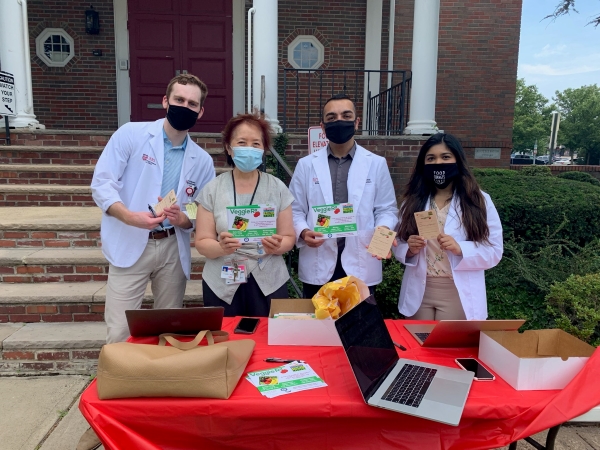
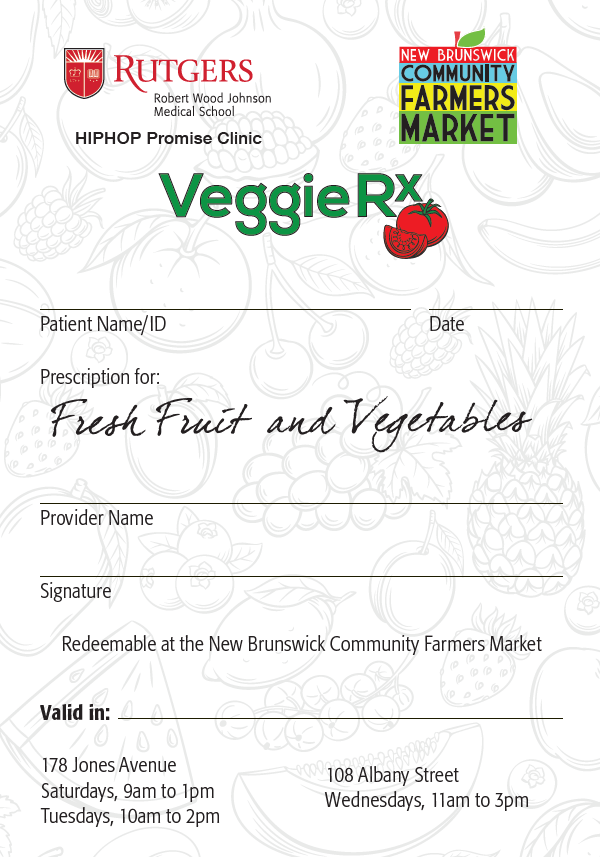
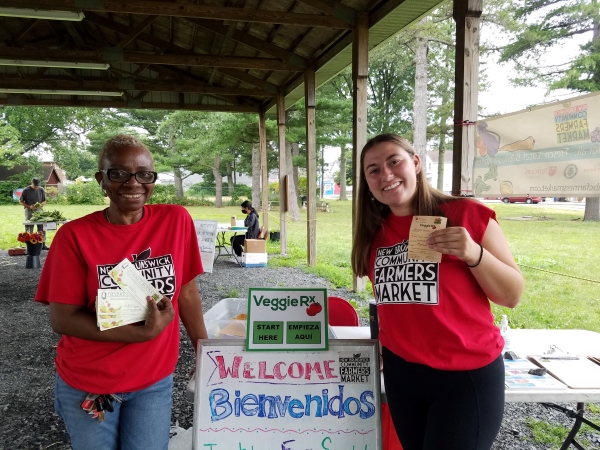
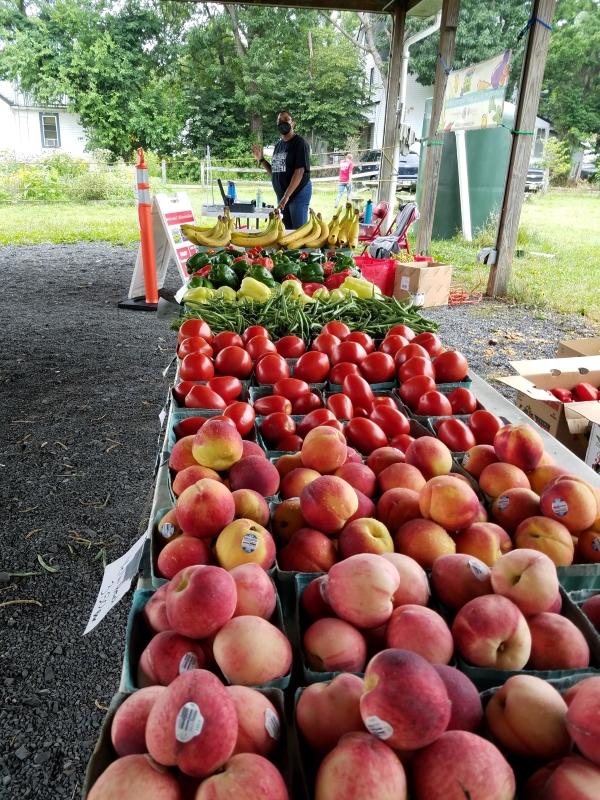
Photos provided by New Brunswick Community Farmers’ Market and HIPHOP Promise Clinic.

